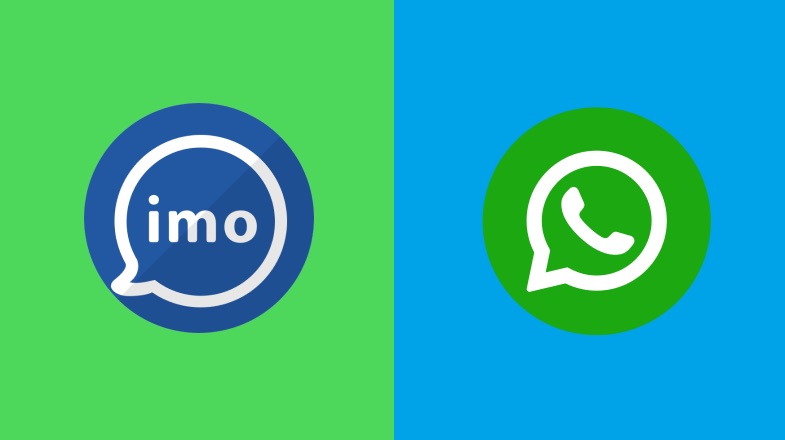IMO and WhatsApp are both messaging apps that people use a lot for different things like calling, chatting, and sharing media. Some people are unsure which one is better between IMO and WhatsApp.
In this article, we’ll talk about the two most popular messaging apps, IMO and WhatsApp. By the end of the article, you’ll be able to choose the best app for you based on what you need.
What is IMO?
Imo is a free and easy-to-use messaging app that lets you make video and audio calls, send texts, and share photos and videos with your loved ones. You can use it on both Android and iOS devices, and it works with Wi-Fi or data. It was established in 2007 and is based in Singapore. With over 200 million users globally, it supports more than 20 languages.
IMO Key Features
IMO offers several key features that make it a standout messaging app:
Free International Video and Audio Calls: A significant attraction for users is the ability to make clear video calls internationally, even on 2G connections. This makes IMO a reliable and cost-effective choice.
End-to-End Encryption: For those who prioritize privacy, IMO ensures secure communication with encrypted messages and calls, providing reassurance for sensitive conversations.
Large Group Chats: IMO is perfect for extensive communities, organizations, or online classes, allowing users to engage with up to 50,000 people in a single group. This facilitates collaboration on a large scale.
Disappearing Messages: Adding an extra layer of privacy and control, IMO lets you send messages that automatically delete after a chosen time, ensuring temporary conversations stay that way.
Low Data Usage: IMO is appreciated by users mindful of their data usage. Its optimized data consumption is ideal for those with limited mobile plans or unreliable internet connections.
Cross-Platform Availability: IMO provides unmatched convenience by being accessible on various devices, including Android, iOS, Windows, macOS, and as a web app.
IMO Limitation
Occasional Bugs and Glitches: Although not widespread, users have reported occasional bugs or glitches that can disrupt the overall user experience.
Lack of Advanced Features: IMO lacks some advanced features found in other messaging apps, such as deeper integrations, bots, customizable chat themes, and advanced file-sharing options. This may be a drawback for users seeking more extensive functionality.
Advertising: While IMO primarily relies on in-app purchases for revenue, some users may encounter occasional ads on the platform, which can be intrusive for some.
Data Privacy Concerns: Despite end-to-end encryption for messages and calls, some users express concerns about IMO’s data collection practices, particularly regarding contact lists and usage statistics.
Limited Platform Support: Although available on major platforms, IMO may not extend to some less common devices or operating systems, potentially excluding certain users.
Potential Geo-Restrictions: Certain features, like content in the Discover tab or specific stickers, may be geo-restricted, resulting in a less consistent experience for global users.
What is WhatsApp?
WhatsApp is a widely used messaging app owned by Meta (formerly Facebook). It enables users to send text, voice, and video messages, make voice and video calls, and share various content like images, documents, and location information.
Also, Read This: Can I Get the WhatsApp Chat History Of Others?
WhatsApp Key Features
WhatsApp comes with a range of features that make it a go-to messaging app:
Instant Messaging: Easily send and receive text messages, photos, videos, and documents in one-on-one or group chats. The user-friendly interface ensures smooth communication.
Free Voice and Video Calls: Make free calls worldwide using Wi-Fi or data, providing a reliable and cost-free alternative to traditional phone calls. The call quality is generally good.
Secure Communication: End-to-end encryption ensures that your messages and calls remain private, offering you control over your communication.
Group Chats: Connect with larger groups with group chats accommodating up to 256 participants. Ideal for sharing updates, planning events, or having lively conversations.
Disappearing Messages: Enhance privacy by sending messages that vanish after a chosen time, suitable for sensitive or temporary conversations.
File Sharing: Share more than just text – send photos, videos, documents, and files up to 2GB in size, making WhatsApp versatile for collaboration and information sharing.
Stickers and GIFs: Express yourself with a diverse collection of fun stickers and animated GIFs, adding personality and humor to your chats.
Web and Desktop Apps: Conveniently access WhatsApp from your computer or laptop using its web and desktop apps, allowing for seamless device transitions.
Global Reach: With over 2 billion users globally, WhatsApp makes it easy to connect with people worldwide, regardless of their location.
Regular Updates: WhatsApp continually improves with regular updates, introducing new features, fixing bugs, and enhancing the overall user experience.
WhatsApp Limitation
Privacy Concerns: As a part of Meta (formerly Facebook), WhatsApp raises privacy worries for some users due to potential data collection practices. While messages are encrypted, metadata such as contact lists and usage statistics may still be gathered.
Media File Size Restriction: Sharing files larger than 2GB requires external services, which can be inconvenient for substantial data transfers.
Occasional Bugs and Glitches: While not widespread, users occasionally encounter glitches or bugs, causing temporary disruptions in the user experience.
Dependence on Stable Internet Connection: Voice and video calls, as well as sending and receiving large files, require a stable internet connection, which can be limiting in areas with poor connectivity.
Potential for Fake News and Misinformation: WhatsApp’s wide reach and easy sharing make it susceptible to the spread of misinformation and fake news, emphasizing the need for users to verify information sources.
Potential Spam and Abuse: Like any open platform, WhatsApp can be a target for spam and abusive messages. Users should be cautious about accepting messages from unknown contacts and use reporting mechanisms to address these issues.
Conclusion
We hope you’ve got all the details about WhatsApp and IMO. Each app has its pros and cons, and your choice depends on what works better for you. Thanks for reading. If you have more questions or need help, feel free to ask.
